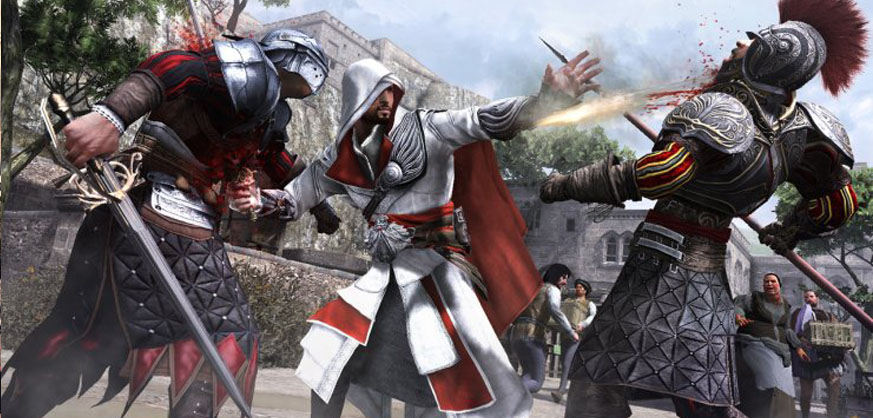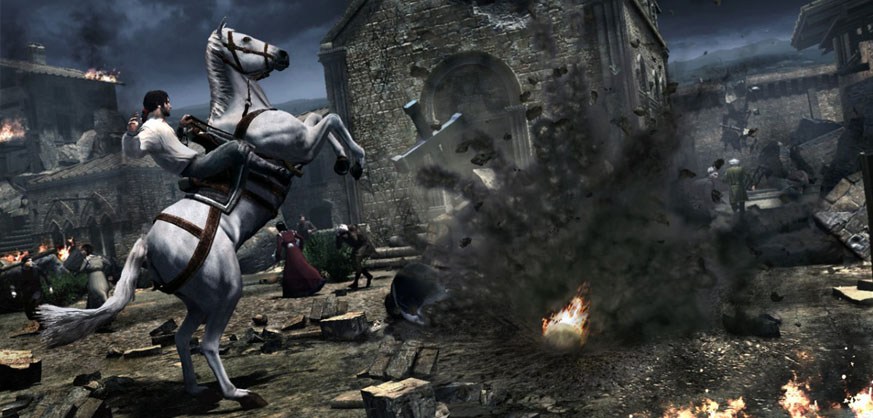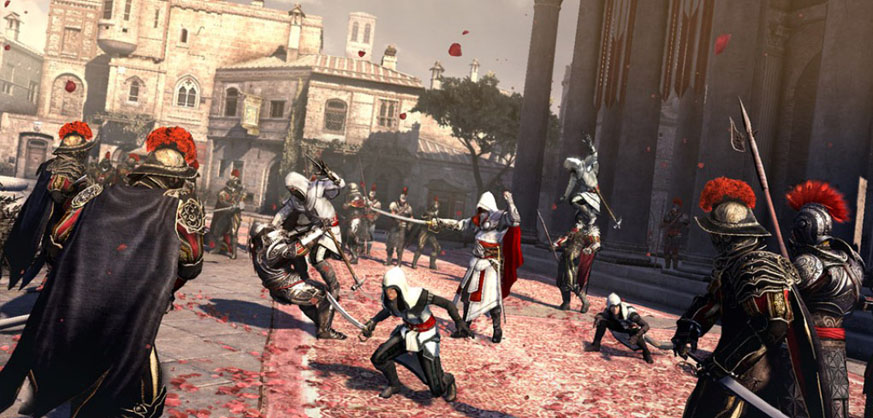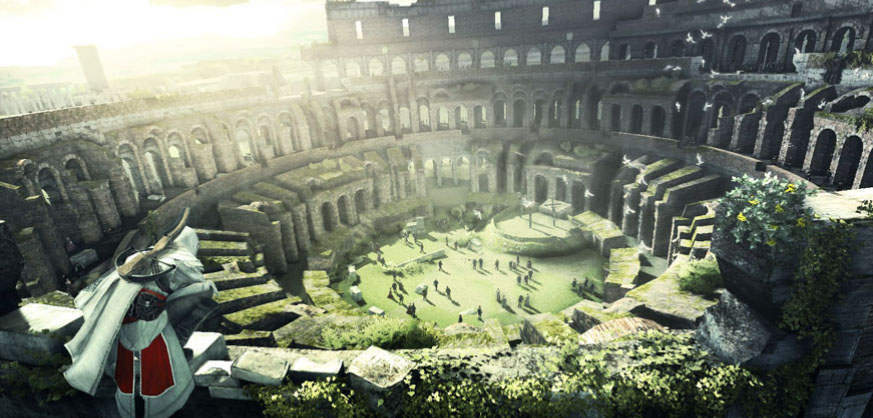Assassin’s Creed Brotherhood – polished to near perfection
Before jumping into the review of Assassin’s Creed Brotherhood, here’s a little backstory. If you haven’t played the first two games, and are one of those “don’t offend my eyes with spoilers” type, you’ve been forewarned. Just skip ahead to where it says “The review” and you’ll be fine. Some of this just isn’t going to make sense.
A quick backstory
The original Assassin’s Creed is a science fiction game, in which modern day bartender Desmond Miles is kidnapped by a company called Abstergo and strapped to a machine called the Animus. This machine allows one to access the memories of ancestors via the sci-fi trope of genetic memory. Desmond happens to be a descendant of Altaïr ibn La-Ahad, an assassin from the era of the Crusades. Altaïr knows something about a missing artifact, and Abstergo wants this information. You see, Abstergo as a corporation is the modern day front for the Templars, and the world is about to end, and this artifact is going to play a key role. Though there is some nominal gameplay in the modern world, the vast majority of it took place in the 12th century.
The sequel continued Desmond’s story, but with a new ancestor, one Ezio Auditore da Firenze, who lived in Italy in the late 15th and early 16th century. The battle struggle between the Templars and Assassins continues unabated. Apparently this has being going on for a LONG time, and you get a better idea by the end of the second game just how long. We also find out that Desmond, via the Animus, is retaining some of the skills of his ancestors. Since he’s reliving their experiences, it’s a kind of muscle memory through a proxy.
The review
“This work of fiction was designed, developed and produced by a multicultural team with varied religious faiths and beliefs.”
This is how each of the Assassin’s Creed titles opens up. While the time period and setting of the new game isn’t as explosive as the original, the disclaimer itself tells you that you may be in for some uncomfortable bits, and does lend extra weight to the story. Contrast that with the plethora of shooters out there that might as well start off with an irony free “America, Fuck Yeah!”, and and Brotherhood is downright classy in comparison. That just be my tastes though.
This time around, Ezio is out for revenge. To say what for would be a spoiler. Suffice to say that he spends the vast majority of his time in Rome this time round, squaring off against the corrupt Borgia, in particular Cesare Borgia. Desmond and the rest of the modern day Scooby gang are holed up in the Assassin’s Temple in Monteriggioni, hiding from Abstergo and seeking out a piece of the Apple. Once again, Ubisoft has done a brilliant job of blending historical fact with their fiction. There should be a Wikipedia browser built into this series, as I’ve never spent so much time reading about the real world counterparts of game characters and settings. Though Ubisoft was pretty clear that Brotherhood was more of a tangent than a sequel in series, it really is a full fledged game in its own right. In fact, I think that in almost every way, it’s the best in the series so far.
The thematic thrust of the series remains intact, in the writing of Jeffrey Yohalem, who was also one of the writers on the original. This time around, instead of Glyphs revealing an alternate Adam and Eve story, we have Clusters that once again draw on real world geo-political events, and tying them together as machinations of Abstergo, the modern day front for the Templars. Besides the familiar code wheel and image/clue matchig puzzles, Clusters also introduce chess moves and a more complex image search type of puzzle. I know some people aren’t a fan of these, but I love them. Though the larger story is reveealed without ever touching the Clusters, it’s by going through these that the larger story of ‘the Company’ and it’s influence through the ages is revealed. While crafted somewhat from the same alternate history block as The Holy Blood and The Holy Grail, Ubisoft manages to make it their own world, unlike pop-author Dan Brown and the cheese laden Da Vinci Code series of books. Grand conspiracy and shadowy puppet masters are as much thematic connective tissue between the real (Desmond) and unreal (Ezio) as they are the main point of the story, if not more so. At the same time, such grandiose themes rarely come across as overly self-important in the way that say a film like Inception does. Brotherhood manages to strike the right balance between being fairly cerebral and complex story, but rarely sacrifices gameplay to hammer you over the head with how damned clever it thinks it is.
Beyond the overarching storyline, what makes Assassin’s Creed stand out as a series is the constant refinement of the game with each generation. In the original, there was no real economy. In the second game, the player was presented with a homestead to manage and rebuild. In the third we’re presented with a sandbox that evolves as the player moves through it. As much as I loved Assassin’s Creed II, scattering the management throughout the game world makes it much more accessible, and much more engaging, as it’s almost always there, and individual economy building elements are a quick hop-in/hop-out affair, letting you get back to leaping around rooftops and stopping the Borgia rule. Many of the numerous tweaks to the overall gameplay are geared towards a more fluid gameplay style, allowing you to play it the way you want.
The best addition to the game has to be the rebuilding of the Brotherhood. In the course of playing the game, you’ll encounter citizens who are being accosted by the Borgia. When you save them, they pledge allegiance to you and the Creed. At this point, whenever Ezio visits either his main hideout or any number of pigeon coops throughout the land, he’s notified that there are missions with various difficulty ratings available for his recruits to take care of. It’s here that he can assign a mission to 1 to 5 assassins and see a success percentage based on the recruit (or team) assigned to it. In return for a successful mission, each is awarded experience points that can be used to upgrade armour or weapons, until the recruit eventually become a full fledged assassin, complete with ceremonial cut scene. Missions can also fail, and if you lose a recruit, they’re dead for good. Each mission is also assigned a duration, and this is where it gets fun.
You see, besides sending recruits out on missions, you can also call on them for help during your own work in Rome. Is there a pesky guard just out of range of your crossbow, and you don’t want to get detected on a stealth mission? Just whistle out and one of your recruits will swoop in and take care of him. Same applies in battle. If you’re struggling, you can call for help. Have 6 or more recruits available and you can long press the call button to signal the Arrow Storm, which takes out huge swaths of foes without you having to get your hands dirty. Of course, if all your recruits are out doing field work, you have no backup so you have to weigh in on whether you want to go it alone or do something less challenging while you wait for your brotherhood to return.
With the introduction of the recruitment process, the game takes another evolutionary step forward, but it also makes the game easier, almost to it’s detriment. It’s not a deal breaker, but the combination of being much better at freeform rooftop gymnastics and a tweaked combat system just made it feel less challenging. Or maybe I just kick serious ass at this game. In either case, I sometimes feel the challenge isn’t QUITE what the original was. I actually went back to the original game to get a better idea of the differences, and they are there. While I was much more proficient in replaying parts of the original, combat is definitely easier in the latest installment.
That sense of wonder?
As much as the original Assassin’s Creed played like a tech demo more than a fully realized game, when first rolling into Jerusalem the player was greeted with a gorgeous landscape of the city that places you in the era, at least if that player is me. The same applies to unlocking a a new viewpoint in a city, as the camera swirls around Altaïr (or Ezio in the sequels). Due to the level of research the Ubisoft team did in capturing the architecture and ‘feel’ of the old world, that sense of place is still there, but it’s losing a bit of the edge it once have. There are only so many times one can climb up a viewpoint and get sucked into the panorama that is presented. To mix it up, when destroying a Borgia tower you’re given a great shot of Ezio throwing a candelabra into the fire he just set, but that gets played out fairly quickly. From a purely presentation angle, I hope for the next installment Ubisoft gives us a new look, and an updated soundtrack.
As my friend and fellow RGBer Johnny said, the biggest problem with Brotherhood is that the main story is way too short. Sure, Ezio’s story was really wrapped up in AC: II, and Brotherhood didn’t need to exist to continue with the larger Desmond/Abstergo arc. In it’s defense though, the number and variety of side quests pretty much make up for the almost anemic main story. This is due in part to the greater variety of side missions, but also partly due to their integration to the main story. Though building the Brotherhood or helping allies like the Courtesans doesn’t directly affect Ezio’s personal story, it certainly feels that way. Ubisoft Montreal has realized a world that encourages you to poke around in all the corners, even more so than previous installments. Don’t get me wrong. Brotherhood isn’t an RPG by any stretch of the imagination, but the level of immersion the game delivers almost makes you want it to be.
I didn’t touch on the multiplayer, because I only tried it briefly. Don’t take that as a knock against it though. I want to finish all the nooks and crannies of Rome in the early 1500s before going there. The single player alone is worth the price of admission.
Assassin’s Creed Brotherhood is on my very short list for game of the year.









[…] This post was mentioned on Twitter by Doug Groves, rgbFilter. rgbFilter said: Assassin’s Creed Brotherhood – polished to near perfection: Before jumping into the review of Assassin’s Creed B… http://bit.ly/esldA1 […]
[…] Groves Assassin’s Creed: Brotherhood (review) – Like Johnny, I absolutely love the Assassin’s Creed series. I can understand […]